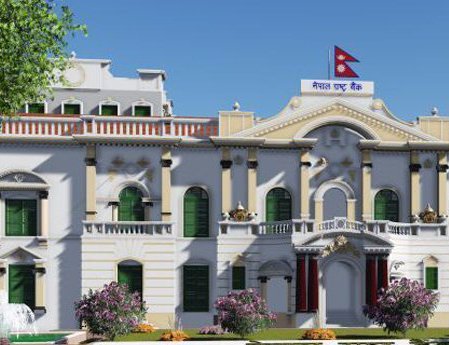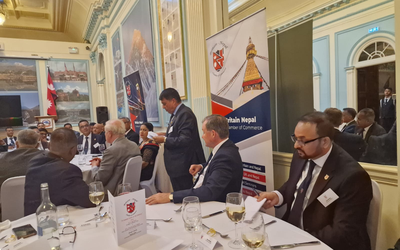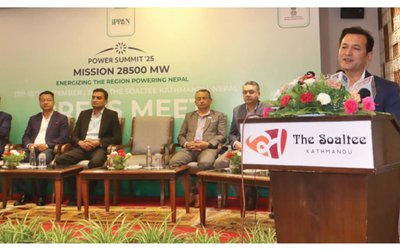
In the meantime, gross foreign exchange reserves decreased by 18 per cent to Rs. 1,146.88 billion in mid-May 2022 from Rs. 1,399.03 billion in mid-July 2021.
In the US dollar terms, the gross foreign exchange reserves decreased by 21.1 per cent to 9.28 billion in mid-May 2022 from 11.75 billion in mid-July 2021.
Of the total foreign exchange reserves, the reserves held by the NRB decreased by 18.3 per cent to Rs. 1017.27 billion in mid-May 2022 from Rs.1244.63 billion in mid-July 2021.
Reserves held by banks and financial institutions (except NRB) decreased by 16.1 per cent to Rs.129.61 billion in mid-May 2022 from Rs. 154.39 billion in mid-July 2021.
The share of Indian currency in total reserves stood at 25.1 per cent in mid-May 2022.
Based on the imports of 10 months of 2021/22, the foreign exchange reserves of the banking sector is sufficient to cover the prospective merchandise imports of 7.34 months, and merchandise and services imports of 6.57 months.
Balance of Payments (BOP) remained at a deficit of Rs. 288.50 billion in the review period against a surplus of Rs. 7.75 billion in the same period the previous year.
In the US dollar terms, the BOP remained at a deficit of 2.41 billion in the review period against a surplus of 55.4 million in the same period the previous year.
Similarly, the current account remained at a deficit of Rs. 547.36 billion in the review period compared to a deficit of Rs.251.29 billion in the same period the previous year.
In the US dollar terms, the current account registered a deficit of 4.57 billion in the review period compared to deficit of 2.14 billion in the same period last year.
In the review period, capital transfer decreased by 41.3 per cent to Rs.7.99 billion and net foreign direct investment (FDI) increased by 18.2 per cent to Rs. 16.65 billion.
Foreign currency reserves downs by 18%
In the meantime, gross foreign exchange reserves decreased by 18 per cent to Rs. 1,146.88 billion in mid-May 2022 from Rs. 1,399.03 billion in mid-July 2021.
In the US dollar terms, the gross foreign exchange reserves decreased by 21.1 per cent to 9.28 billion in mid-May 2022 from 11.75 billion in mid-July 2021.
Of the total foreign exchange reserves, the reserves held by the NRB decreased by 18.3 per cent to Rs. 1017.27 billion in mid-May 2022 from Rs.1244.63 billion in mid-July 2021.
Reserves held by banks and financial institutions (except NRB) decreased by 16.1 per cent to Rs.129.61 billion in mid-May 2022 from Rs. 154.39 billion in mid-July 2021.
The share of Indian currency in total reserves stood at 25.1 per cent in mid-May 2022.
Based on the imports of 10 months of 2021/22, the foreign exchange reserves of the banking sector is sufficient to cover the prospective merchandise imports of 7.34 months, and merchandise and services imports of 6.57 months.
Consumer price inflation has increased significantly in the first 10 months of the current fiscal year 2021/22.
According to the current macroeconomic and financial report published by the Nepal Rastra Bank (NRB) on Friday, the year-on-year (y-o-y) consumer price inflation reached 7.87 per cent in the first 10 months of 2021/22 from 3.65 per cent a year ago.
Food and beverage inflation stood at 7.13 per cent whereas non-food and service inflation stood at 8.45 per cent in the review month.
The average monthly y-o-y inflation for 10 months recorded 5.84 per cent.
Under the food and beverage category, the prices of ghee and oil, fruits, milk products and eggs, pulses and legumes and tobacco products sub-categories rose by 24.86 per cent, 12.61 per cent, 11.30 per cent, 10.53 per cent and 9.70 per cent respectively on y-o-y basis.
Likewise, under the non-food and services category, the prices of transportation, education, and recreation and culture sub-categories increased by 21.81 per cent, 11.64 per cent and 8.21 per cent respectively on y-o-y basis.
In the review month, the Kathmandu Valley, Terai, Hill and Mountain witnessed inflation of 7.39 per cent, 8.15 per cent, 7.89 per cent and 8.21 per cent respectively.
The y-o-y wholesale price inflation stood at 16.06 per cent in the review month compared to 8.05 per cent a year ago. The average monthly y-o-y wholesale price inflation for 10 months was 8.71 per cent.
The y-o-y wholesale price of consumption goods, intermediate goods and capital goods increased by 22.20 per cent, 13.97 per cent and 7.97 per cent respectively.
The y-o-y wholesale price of construction materials increased by 26.82 per cent in the review month.
The y-o-y salary and wage rate index increased by 8.52 per cent in the review month.
In the review month, salary index and wage rate index increased by 9.44 per cent and 8.27 per cent, respectively.
The average monthly y-o-y salary and wage rate index for 10 months was 6.22 per cent.
Remittance inflow increases marginally
Meanwhile, remittance inflows increased by 0.2 per cent to Rs. 811.79 billion in the review period compared to 19.2 per cent in the same period of the previous year.
In the US dollar terms, remittance inflows decreased by 1.6 per cent to 6.76 billion in the review period against an increase of 16.1 per cent in the same period the previous year.
Number of Nepali workers (institutional and individual-new and legalised) receiving approval for foreign employment increased to 278,298 in the review period. It had decreased by 68.4 per cent in the same period the previous year.
The number of Nepali workers (renewed entry) taking approval for foreign employment increased by 185.5 per cent to 230,466 in the review period, the report said.
- PM Oli Returns Home Attending UN FFD4 Summit
- Jul 05, 2025
- Trump signs into law domestic policy bill
- Jul 05, 2025
- Putin-Trump call after US halts some arms shipments to Ukraine
- Jul 04, 2025
- USAID programs officially suspended
- Jul 03, 2025
- Thailand’s Constitutional Court suspended PM Paetongtarn Shinawatra
- Jul 02, 2025















